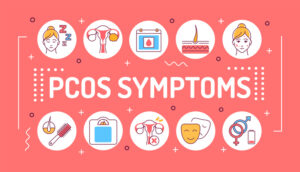PCOS and ADHD are both conditions that can cause a lot of problems in people’s lives. They both tend to be misunderstood, and a lot of people don’t know how to deal with them. In this blog post, we will talk about the relationship between PCOS and ADHD. We will discuss the symptoms of each condition, and we will talk how they are related. If you or someone you know is struggling with either PCOS or ADHD, this blog post is for you!
Contents
Defining ADHD
ADHD (Attention-deficit/hyperactivity disorder) is a neurodevelopmental disorder that is characterized by problems with attention, impulsivity, and hyperactivity. People with ADHD often have difficulty paying attention, they may be impulsive and act without thinking, and they may be constantly moving or talking. ADHD can cause problems in school, at work, and in social situations. It is estimated that about 11 percent of children in the world have ADHD.
Defining PCOS
PCOS (Polycystic ovary syndrome) is a hormonal disorder that affects women of childbearing age. It is characterized by the presence of high levels of androgens (male hormones) in the body, and it can cause a variety of problems, including irregular periods, infertility, weight gain, acne as well as excessive hair growth. PCOS affects about one in ten women of childbearing age, and it is one of the most common hormonal disorders in women. It is also a leading cause of infertility.
Symptoms
While the effects of ADHD are mostly mental which may sometimes manifest in the physical presentation, PCOS has an evident influence on both physical and mental aspects of the body.
ADHD
Symptoms of ADHD may include:
- Difficulty paying attention
- Being easily distracted
- Acting without thinking
- Being impulsive
- Constantly moving or talking
- Difficulty sitting still
- ADHD can also cause problems in school, at work, and in social situations.
PCOS

Symptoms of PCOS may include:
- Irregular periods or no periods at all
- Infertility
- Fatigue
- Weight gain or difficulty losing weight
- Acne and oily skin
- Excessive hair growth on the face, chest, back, or abdomen
- Excessive mood swings
- Mental health problems such as depression and anxiety
How are PCOS and ADHD Related?
PCOS and ADHD share some similarities, the most notable one being that they are both conditions that can cause a lot of problems in people’s lives. They both tend to be misunderstood, and a lot of people don’t know how to deal with them.
Similarities

So, what do you need to know about the relationship between PCOS and ADHD? They share some similarities, but there are also some key differences between them. Some commonly observed similarities are:
- One theory is that PCOS and ADHD may be caused by similar underlying genetic factors.
- Another theory is that the hormonal imbalance associated with PCOS may contribute to the development of ADHD.
- Researches also establish that children whose mothers have PCOS are likely to develop ADHD or autism.
- In comparison to women without PCOS, women with PCOS were more likely to have mental health disorders, including ADHD, BPD, and anxiety.
- It is also believed that the symptoms of PCOS can mimic the symptoms of ADHD, and vice versa.
- It is also said that exposure to male hormones in utero may affect neurodevelopmental outcomes in kids, causing risks in the pregnancy.
- Similarly, women with ADHD are more likely to have high levels of androgens in their bodies than women without the condition.
- Moreover, both conditions can cause problems with weight, fertility, and mental health.
- In addition, both conditions can cause problems with attention, impulsivity, and hyperactivity. PCOS may cause an individual to be inattentive of their surroundings due to their fixation on the disorder.
- For example, weight gain is a symptom of PCOS, and it can also be a symptom of ADHD.
Differences
- PCOS is a hormonal disorder that primarily affects women of childbearing age, while ADHD is a neurodevelopmental disorder that can affect both children and adults.
- Additionally, the symptoms of PCOS are primarily physical, while the symptoms of ADHD are mostly mental.
- ADHD and PCOS also have distinctions in their course of treatment. ADHD is typically treated with medication and/or therapy, while PCOS is often treated with medication, diet, and lifestyle changes.
- PCOS can lead to other serious health problems, such as type II diabetes and heart disease, while ADHD does not appear to cause any long-term physical health problems.
- PCOS can also lead to other serious health problems, such as type II diabetes and heart disease, while ADHD does not appear to cause any long-term physical health problems.
- It is believed that ADHD impacts boys more than girls. The ratio is about four to one. PCOS, on the other hand, affects girls and women equally.
- Finally, while there is no cure for either condition, there are treatments available that can help to manage the symptoms of both PCOS and ADHD.
Treatment Options

If you think you may have PCOS or ADHD, it is important to speak to your doctor. They will be able to provide you with a diagnosis and discuss treatment options with you.
Both PCOS & ADHD are diagnosed by taking into account medical history along with physical exams & lab tests. If you think you might have either condition, it’s important to speak to your doctor.
For PCOS
PCOS is treated with a combination of medication, diet, and lifestyle changes. The specific treatment will depend on the individual’s symptoms.
Medication
There are a variety of medications that can be used to treat PCOS. The most common ones are:
Diet And Lifestyle Changes
In addition to medication, making some lifestyle changes can also help to manage the symptoms of PCOS. These include:
- eating a healthy diet
- exercising regularly
- managing stress
- losing weight
Therapy
Cognitive-behavioral therapy (CBT) is a type of therapy that can help in treating PCOS. CBT can help to change the way you think about and cope with your symptoms. It can also help you to make healthy lifestyle changes.
Support groups are another option for people with PCOS. They provide an opportunity to meet other people who are dealing with similar issues. These groups can offer support and advice.
For ADHD
ADHD treatment generally involves a combination of medication, behavior therapy, and lifestyle changes. The specific treatment approach depends on the individual’s age, symptoms, the severity of the disorder, and other factors.
There is no one-size-fits-all treatment for ADHD, but there are various options available that can help to manage the symptoms. These include medication, therapy, and lifestyle changes.
Medication
There are various types of medication available to treat ADHD, including stimulants and non-stimulants. Stimulants are the most commonly prescription type of medication for ADHD. They work by increasing levels of dopamine and norepinephrine in the brain, which can improve focus and concentration.
Non-stimulant medications include antidepressants, antihypertensives, and antipsychotics. These medications work by targeting different chemicals in the brain than stimulants. They may be used alone or in combination with other medications.
Therapy
Behavioral therapy is a type of psychotherapy that can help to change destructive or harmful behaviors. It can also teach new skills and strategies for dealing with difficult situations. This type of therapy is often used in combination with medication to treat ADHD.
There are also support groups for both PCOS and ADHD that can provide information and emotional support.
Lifestyle changes
Making lifestyle changes is often a recommendation for both PCOS and ADHD. These can include:
- Eating a healthy diet
- Getting regular exercise
- Getting enough sleep
- Managing stress
- Avoiding alcohol and drugs
Conclusion
While there are some similarities between PCOS & ADHD, they are two distinct conditions with different causes & treatments. If you think you might have either disorder, it’s important to see a doctor so that you can get the proper diagnosis & treatment. With the right management, both conditions can be well-controlled & you can live a normal, healthy life.
For more information, please contact MantraCare. ADHD is a neurodevelopmental disorder characterized by difficulty in paying attention, hyperactivity, and impulsivity. If you have any queries regarding Online ADHD Counseling experienced therapists at MantraCare can help: Book a trial ADHD therapy session


